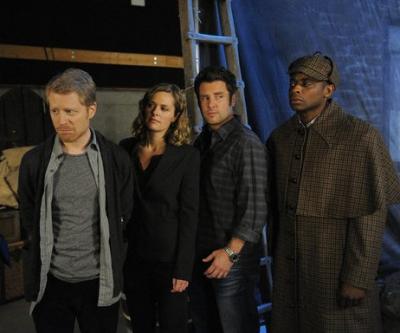
Yesterday, TV Tango participated in a conference call with PSYCH stars Dulé Hill and James Roday and series creator Steve Franks, who provided a behind-the-scenes peek of the upcoming musical episode with their on-set stories, revealed their favorite musical numbers, and dished about the talents of their co-stars. We transcribed and edited their full phone call, removed details of a spoiler, and added some photos from the musical episode.
PSYCH: THE MUSICAL premieres on Suday, December 15, 2013 from 9-11pm ET/PT on USA. Then, less than a month later, PSYCH returns for its eighth season on Wednesday, January 8, 2014 at 9pm ET/PT on USA.
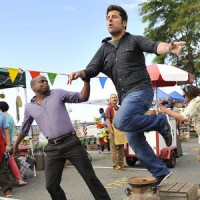 |
Question: What was your biggest challenge with PSYCH: THE MUSICAL?
Dulé Hill: For me, it was writing. To write all of those songs out of my brain. I wrote every song. It really was a hard thing to do. (laughing)
Steve Franks: For me, doubling all of Dulé's dancing in the close-ups was really hard, because I haven't tapped for very long. But it was worth it; it was great. It was like one of those great body-switching movies. We really enjoyed it. We learned a lot about ourselves and those around us by switching bodies for a very short period.
James Roday: I think my neatest trick was being in Hawaii the entire time, while my stunt double did the entire thing. Nobody said a word; nobody questioned it for one second. I don't know. I thought that was pretty good work by me.
|
|
Steve Franks: If I could just answer for James and Dulé, on their part. I can't begin to tell you how many takes we did of these enormous dance pieces that went up and down stairs and were jumping and leaping and stuck with a very difficult lip-synch that these guys were pretty flawless throughout the whole course of the thing -- and hitting all the steps. I just can't begin to tell you how tired I imagined they were watching them. Not only were they willing to do another take, often times I'd yell "Cut!" and they'd just immediately say, "Let's do another one." I just can't imagine the level of physical peaks that these guys must be in.
James Roday: Well, after all the work that Steve did just to get us there, there was no way that we weren't going to step up to deliver the goods. He wrote 37 original songs, which he narrowed down to 21, which he narrowed down to 12. He wrote the whole thing. He composed it with Adam Cohen. He directed it. It was a gargantuan, Herculean task that he took on, so in some ways, when you think about it, Dulé and I had the easy job of just bringing it to life.
Dulé Hill: To go back to answer your question about what was daunting about it. Think about what Roday just said, and we didn't have an extra time. That's what made it so daunting. I think if we had known we had an extra five days to do it, then it wouldn't have seemed so big for us, but the fact that we were doing a two-hour movie special with music and all those things in the same time frame as it took us to do a normal episode, which we already have trouble making anyway, that was daunting.
Steve Franks: And it wasn't like the rest of the episode was them standing around in the Psych office and having conversations. There was chases through the woods; there's an enormous fight with a hanging scene. It was a big episode even if you don't put the musical numbers into it. Most importantly, it was at episode 14 and 15 of the season, so we had already shot 13 episodes. We're at the end of our run. Usually at that time, everybody's running on fumes anyway. I think, across the board, everyone was really running on adrenaline, and we still don't know how we finished it.
James Roday: It's insane. It's insane that we shot an episode after that. What was that?
Dulé Hill: I have no idea. I have no idea.
Steve Franks: I'm trying to remember. You didn't direct that, did you, James? James usually directs the last one and the first one.
James Roday: It wasn't me. It was some poor episode that got stuck with that spot.
|
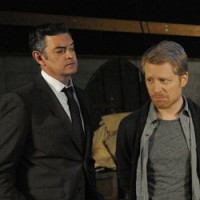 |
Question: Which cast member surprised you most with their singing and dancing in the musical episode?
Dulé Hill: For me, it was Timothy Omundson. I think he has an amazing baritone voice. He really is a wonderful singer. I always knew Tim could sing, but I was really impressed with the tone of his voice and how much of a pure singer he is. I would love to see him do another musical on film on or TV or on stage, because I just think he's that good.
James Roday: Yeah, I totally agree with that, and I was also really proud of Kurt Fuller, who claimed to be tone deaf, and right up until the last second wasn't even going to sing his song. He was going to lip synch it to another man's voice -- it was going to be like a gag. But at the last second, he decided to shed his inhibitions and give it a shot. I think he sounds great. I can't imagine that song not being performed by him and piping in another voice. It just wouldn't have been the same. So credit to a non-singer stepping up and going for it.
|
|
Dulé Hill: The one cast member who's not on the show all the time and whose voice I didn't like in the musical was Curt Smith. That probably would be because he wasn't in the episode. But I didn't like his voice in the muical episode of PSYCH, because it was nonexistent. [laughing]
James Roday: We really covered a lot of ground with that.
Steve Franks: The key is, with the first question, answer all the other questions.
James Roday: By the way, we want to congratulate our moderator, Eric, on being named the Moviefone guy. [others laughing] I want to give him his due as well.
|
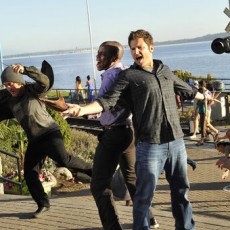 |
Question: It's incredible to see the level of support you have from your fans -- I'm pretty sure if you guys did the phone book, people would watch it and be thrilled about it.
Steve Franks: By they way, we did the phone book once; it was a terrible episode.
Question: How much did that fan support really help you bring this idea to fruition and sell it to the network?
|
|
Steve Franks: We did something really smart. Before we had a concept or anything locked in, we went ahead and made a big announcement that it was going to happen, which kind of forced everybody's hand -- most importantly, our own. We announced it at Comic-Con in front of a big crowd with the president of the studio there, knowing that there was no turning back at that point. We were able to sort of drum up our own social-media support from the stage of Comic-Con. Unfortunately, we probably should have had more details worked out before we did it, but I think it worked out great, despite that terrible episode where we did the phone book. By the way, I think the problem was we did the letter J. I was really pushing for Q, but everybody thought it was too out there. [laughing] I think our fan base supported us when we did TWIN PEAKS, supported us when we did CLUE. This really seemed kind of safe compared to many things we'd done in the past.
Question: Could you send me a copy of that phone book episode?
Steve Franks: I have only the rough cut; we really haven't finished it. It will be a DVD extra. [laughing]
James Roday: Bruce Greenwood is great in it.
Steve Franks: By the way, I just got a text, and Eric, our moderator, has just been selected as the announcer for this year' GOLDEN GLOBES. Double congratulations. What a day for you, Eric!
James Roday: The longer we keep this going, the more jobs he's going to get!
|
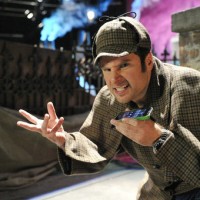 |
Question: What was the initial reaction from the cast and crew to the idea of a musical episode?
Steve Franks: I know the crew was really looking forward to it. I just wanted to see James and Dulé sing while the cameras were rolling, because they were constantly singing when the camera weren't rolling. It was the sort of itch that needed to be scratched. For me, it was the pinnacle of the show. I can't speak for James and Dulé.
|
|
Dulé Hill: We were excited to do it, but, as I said earlier, it was daunting, because it's a lot. We're a basic cable show, so we don't have all this extra cash flowing around. What we do, we always fit within our budget. I didn't know how we were going to do it. And then I heard we were going to do original songs -- we weren't going to GLEE up -- I was like, "I don't know how we're going to do this." It was a little daunting, but I was definitely game for it. I said, "You know what? We're PSYCH. We always swing for the fences, so let's go for it."
James Roday: Steve's been so generous with letting us -- and me, especially, and some of the other writers -- have the autonomy to do crazy things to his show over the year, knowing that this was sort of his baby. This was his crown jewel. This was his legacy. If every other episode of PSYCH somehow got destroyed or locked away in a vault and the only thing that stayed was the PSYCH musical, I think he could still feel pretty good about it. Knowing that that's where his head was at, it was a no-brainer. He could've told me to jump off of a building. I was Denzel Washington in GLORY; I was going to pick up the flag no matter what. No matter how crazy it sounded. No matter how daunting it sounded. No matter how many naysayers or concerns there were, I was going to pick up pom poms, and if we went down, we were going to go down together. That was my mentality.
|
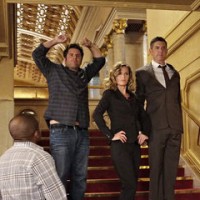 |
Question: Steve wanted me to ask what your perfectly vulgar response was to "That SOB just punched me in the nose"?
Steve Franks: You remember that James? I don't know if we can recite it. It was one of my insider tidbits. At the very end of the first hour, you were supposed to say "That SOB just punched me in the nose," but I don't think we can repeat it.
James Roday: I said something different, and it's for the Cinemax After Dark version.
|
|
Steve Franks: You have to meet James in person. He'll make sure no children are around, and he'll whisper it to you. Or, if you happen to go to New York and see "After Midnight," then Dulé Hill will tell you in person. But you have to get proof of purchasing a ticket; you're not getting a ticket for free.
James Roday: Yeah, you can't second act that. Don't pull some second-act nonsense. Actually, there is no second act.
Dulé Hill: On a side note, if anybody is wondering what I am doing right now, I am eating pad thai and spring rolls. That's what I'm doing.
|
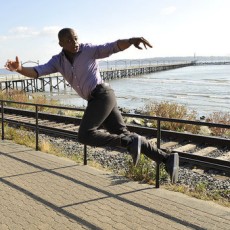 |
Question: Were there any dancing injuries during the musical episode?
Dulé Hill: Injuries? No, I don't think so.
James Roday: Shockingly, I think we all made it out of there unscathed, which is crazy, because we all deserved to get injured, but somehow none of us did.
|
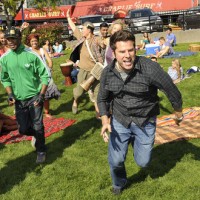 |
Question: What was the hardest number for the cast to nail?
James Roday: I'd say it was probably the opening number, just because there were so many elements involved. The numbers kind of got smaller as they went along, but that first one was huge with all kinds of backup dancers and choreography and timing issues -- and the lip synching at the same time. That definitely felt like the biggest challenge for me, and luckily we knocked it out on the first day. After we did that, it kind of gave us all a little bit of a boost, like "Hey, we just knocked out the monster. We're gonna be good!"
|
|
Steve Franks: Remember, the next day was "When You're Making Up a Song," which is the second biggest. We did "I Heard It Both Ways" on two separate days. That would've been more challenging, but not for Dulé, who walked around and followed on that one.
Dulé Hill: That was a very hard number for me -- a lot of sweat and tears to get that number right.
Steve Franks: We shot the first half of "I Heard It Both Ways" before the worst torrential rain storm of the season came in. We shot it at the hospital location, and that went very smoothly and it was great. And then we went down to this park, which when I scouted it was the more picturesque, beautiful park. It was perfect. It started to rain, and by the time they started dancing, the mud was so thick that you would leave an inch-deep footprint. James and Tim [Omundson] are tangoing and throwing each other around out there. It was quite the challenge in terms of production.
Dulé Hill: Roday took a [stumble] when he went over the chair.
James Roday: I did. When I had to go over the bench, there was like a mud-slide situation happening. I went down. I went down, but I got up.
Steve Franks: The funny thing is that I had the special-effects guys rig a bench that would spring over, and it didn't work as we hoped for all their great efforts. James got there on the day and said, "Why don't I just ride it over?" He actually did the full-on Gene Kelly right there, and rode the thing down. He was perfect every time.
James Roday: I had recently seen TRAINSPOTTING again, for the first time in many years, and Ewan McGregor did all of those toilet takes himself, and I was like, "You know what? I'm doing this bench thing. I'm doing it."
Dulé Hill: Roday rode that thing, and he rode it hard, he fell hard, and he got back up even harder.
James Roday: That's right. All of that's true.
|
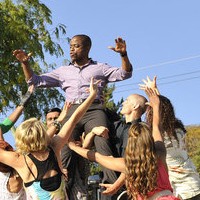 |
Question: Will fans be able to buy the music online?
Steve Franks: They will. We just mastered the soundtrack; it's going to be a digital soundtrack. I'm not 100% sure this is correct, but we're hoping to have it released on iTunes a few hours after the New York premiere, maybe like midnight after the show airs. I have to say that it's my favorite album of all time. [laughing] It sounds spectacular.
By the way, I just wanted to chime in real quickly. I just got a Google Alert that Eric, our moderator, is the new male voice of Siri, and I'm really excited for you, Eric.
James Roday: That's a huge one. I don't know if we're going to be able to top that. Everybody's got an iPhone.
|
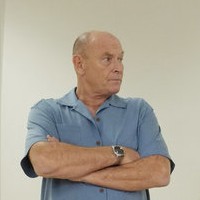 |
Question: Does every regular cast member sing and dance in this episode?
James Roday: No.
Dulé Hill: One of us does spoken word.
James Roday: There's one cast member who got off without having to carry a tune.
|
|
Steve Franks: That's Corbin Bernsen, and I found out after the fact that he really wanted to participate. That's on me. I asked him if he could sing when I was putting it together, and he said that he could talk-sing. I thought that meant, "OK, I really won't sing," but it turns out he really wanted to talk-sing. That was my bad and my failure. Now I'm on the hook to write another musical, just so I can cast Corbin Bernsen in it to do a talk-sing.
|
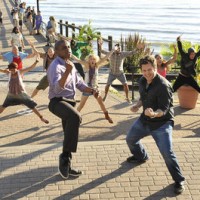 |
Question: Did the cast have to do any special preparation to sing or dance in the musical episode?
Dulé Hill: We probably should have, but we didn't have the time to.
James Roday: The truth is, we should've done a lot of prep for this thing, but we didn't have the luxury of doing that. We met with the choreography for half of a Saturday, and he ran us through every number. It was like, "OK guys, you're all going to remember that, right?" That was it; that's what we got. When we got on set, it was like, "Some of this kind of, sort of feels familiar." There was a lot of on-the-spot regurgitation a little bit of audible. We called some audibles. It worked out. It somehow came together. I'm very proud of every one.
|
|
Dulé Hill: Paul Becker was the choreographer. He did a good job of taking our bodies and what we can do and using that, instead of just trying to turn Roday into Baryshnikov or turn Tim into somebody else or even myself into somebody. If this is what you can do, this is how we'll work it into the show. I definitely take my hat off to Paul Becker for doing that.
Steve Franks: Paul was fantastic. He wanted so much out of us. He was like, "What days can we have rehearsals?" Just prior to this, there had been a hiatus. Dulé had had a well-deserved break for just a couple days, and he had tickets to, I think, a Jets game. You cut into a big chunk of this, just to record the songs the week before. I have these terrible drawings on my script of what I assumed might happen, and I gave Paul the parameters. Paul and I were not even in the same country until we started shooting, so it was a lot of "Let's see what we have and make it work there," but I think that's what kind of gives energy and excitement to it. We found the shortcomings on the spot, and we had no choice but to fix it. We knew we had no extra time to fix it either, because we were operating on a regular schedule.
James Roday: Just to echo something that Dulé said earlier, it was Paul's initial instinct to turn Tim into Gene Kelly and me into Mikhail Baryshnikov, but we're both like, "Paul, it's just not going to happen. Look at our skillset." The odd part of it was that he knew Dulé was a trained dancer, and so he wanted to turn Dulé into Mandisa, a former AMERICAN IDOL contestant, which makes no sense in the context of our musical or what we were doing. Dulé had to also say, "Paul, not happening, because it just doesn't make sense, man."
|
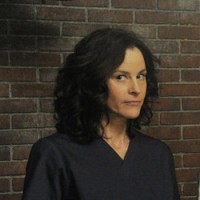 |
Question: From the musical episode, what was your favorite number and which one do you think fans will like the best?
Steve Franks: I love them all in big ways, but there's a special place in my heart for the song that Jimmi Simpson sings to Ally Sheedy as [spoiler redacted], just because that song and that scene encapsulate everything that our show is about -- it's ridiculous and it's heartbreaking at the same time. It has all the emotions that we hope to play on the show, and it's probably my favorite thing I've ever gotten to shoot on the show and one of the great memories. James actually stayed afterwards, done shooting, and I turned to him after the first take and said, "When I think back to the show in 50 years, this is probably the night I'm going to remember."
|
|
James Roday: I'm glad that Steve gave that answer first, because it's my answer, too. I always feel a little weird about it, because he wrote all of these incredible songs and these big numbers that we're all in -- we regulars of the show were dancing and running around and jumping up and down and giving everything we have. I have to agree, my personal favorite is the quiet moment between two guest stars. It's really poignant for me. I was really heavily involved in the Yin-Yang mini-franchise, or whatever you want to call it, and watching that moment was really poignant for me. Steve nailed it -- it's PSYCH ridiculous with this undercurrent of "Why am I touched by this? I have no business being touched by this." But I think it works to great effect, and it's my favorite as well.
Dulé Hill: When that piece was being filmed, I believe I was at home on my couch watching TV. Or, if anything, I was in my trailer sleeping. I don't have anything to say about how poignant it was to see it being filmed or anything, because I wasn't there. For me, it's actually the opening number of the musical, "Under Santa Barbara Skies," because I feel like Steve did a great job of capturing exactly what the show is in those first few minutes. If you've never seen an episode of PSYCH and you watch that musical number and listen to the words and see what's happening on screen, you get the whole picture of what PSYCH is. I thought that was a pretty brilliant stroke right there to be able to do that and launch us off into this musical episode.
|
| |

|
|

|
